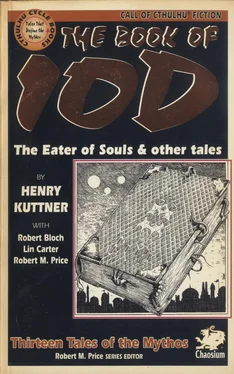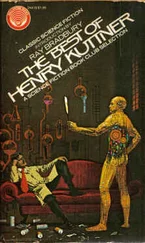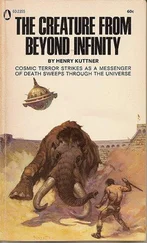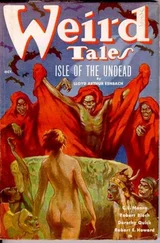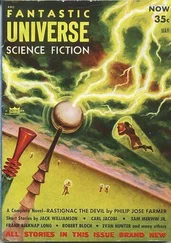Henry Kuttner - The Book of Iod
Здесь есть возможность читать онлайн «Henry Kuttner - The Book of Iod» весь текст электронной книги совершенно бесплатно (целиком полную версию без сокращений). В некоторых случаях можно слушать аудио, скачать через торрент в формате fb2 и присутствует краткое содержание. Год выпуска: 1995, ISBN: 1995, Издательство: Chaosium, Жанр: Ужасы и Мистика, на английском языке. Описание произведения, (предисловие) а так же отзывы посетителей доступны на портале библиотеки ЛибКат.
- Название:The Book of Iod
- Автор:
- Издательство:Chaosium
- Жанр:
- Год:1995
- ISBN:9781568820453
- Рейтинг книги:5 / 5. Голосов: 1
-
Избранное:Добавить в избранное
- Отзывы:
-
Ваша оценка:
- 100
- 1
- 2
- 3
- 4
- 5
The Book of Iod: краткое содержание, описание и аннотация
Предлагаем к чтению аннотацию, описание, краткое содержание или предисловие (зависит от того, что написал сам автор книги «The Book of Iod»). Если вы не нашли необходимую информацию о книге — напишите в комментариях, мы постараемся отыскать её.
The Book of Iod — читать онлайн бесплатно полную книгу (весь текст) целиком
Ниже представлен текст книги, разбитый по страницам. Система сохранения места последней прочитанной страницы, позволяет с удобством читать онлайн бесплатно книгу «The Book of Iod», без необходимости каждый раз заново искать на чём Вы остановились. Поставьте закладку, и сможете в любой момент перейти на страницу, на которой закончили чтение.
Интервал:
Закладка:
The door, surprisingly, was an imposing slab of solid oak. A small brass plate above the bell read Zamak. Shivering a little, the young woman pressed the bell. She did not have to wait long before it opened noiselessly on well oiled hinges.
In the doorway was a tall man, lean and rangy, in an immaculate white jacket—a Hindu of some sort, from his swarthy, hawk-like face and spotless turban. Keen dark eyes as sharp as dagger points scrutinized her closely.
“Pray come in, madame,” said the Hindu with a slight bow. “The sahib is expecting you. Let me take your wrap.”
Mechanically, Dona Teresa handed him her gloves and fur, staring about the foyer with astonished eyes. Nothing about the locale or outward appearance of the little house could have prepared her for its furnishings. The foyer held an immense bronze Chinese incense burner on a teakwood stand; Tibetan tonkas or scroll-paintings adorned the walls, which were hung with watered silk. Lush Persian carpets were soft and thick underfoot.
She was ushered into a small study and informed that her host would attend her presently. As the door closed softly behind the tall servant, Dona Teresa looked about, her amazement growing. All her young life she had been raised in luxury, but nothing like this. Furniture of antique workmanship stood here and there, all of carved and polished teak, inlaid with mother of pearl or ivory plaques. The walls were hung with rich brocade and displayed illuminated cabinets crowded with exquisite antiquities—Etruscan, Greek, Roman, Hittite, Egyptian—museum-worthy pieces all. The carpet underfoot was a superb Ispahan of fabulous value, faded with centuries but still glorious. A subtle fragrance hung on the still air, rising in blue and lazy whorls from the grinning jaws of a silver idol of Eastern work.
Bookshelves held hundreds of scholarly-looking tomes whose gilt titles were in Latin, German, French—Unaussprechlichen Kulten, Litre d'lvon, Cultes des Goules. None of the titles were familiar to her, but they held a sinister connotation of the occult, of the nightside of science and philosophy.
A carven teakwood desk was drawn up before a fireplace. It held a clutter of books, manuscripts and note pads, weighed down with Egyptian tomb figurines of blue faience, huge scarabs of schist, Babylonian or Sumerian tablets of baked clay inscribed with sharp cuneiform. Above the fireplace hung a grotesque mask of carved and painted wood, scarlet, black, and gold. It depicted a hideous devil face with three glaring eyes and open-fanged jaws from which escaped painted gold whorls of stylized flames. She was staring up at it with fascination mingled with revulsion when a quiet voice spoke from behind her, startling the girl.
“Tibetan,” said the voice. “It depicts Yama, King of Devils. Some say that he was worshiped in pre-history, in Lemuria, as Yamath, lord of fire.”
The girl turned swiftly. Her host was tall, slender, saturnine, with a fine-boned visage as sallow as old ivory. His hair was sleek, seal-black, with a dramatic streak of pure silver that began at his right temple and zigzagged to the base of his skull. The dark eyes were hooded and cryptic and thoughtful. His age was indeterminate. He wore a dressing gown of black silk acrawl with writhing gold dragons.
“I am Anton Zarnak,” he said with a slight smile, “and you are Miss de Rivera. Pray make yourself comfortable.” Zarnak glanced at a side-table laden with crystal decanters. “A sip of brandy, perhaps?”
“No, thank you,” the girl declined, sinking into a deep chair. Zarnak nodded, seating himself behind his desk. He opened a notebook and selected a pen.
“How can I assist you?” he inquired.
2. Night-Fear
Dona Teresa twisted her hands together. “Doctor, there is nothing the matter with me. It is my uncle, Don Sebastian de Rivera. We are the last survivors of an old California family of Hispanic origin. Ever since my parents died when I was a child, Don Sebastian has been my guardian and my dearest friend. Now he is suffering in the grip of some terrible thing—some hideous curse—I come to you for aid. No one else can help; my uncle forbids it.”
“Indeed? And what is the problem?”
Dona Teresa lowered her head, veiling lustrous dark eyes behind thick lashes. “It sounds ridiculous— he is afraid of the dark. "
When Zarnak made no response, the young woman continued in a rush of words. “He has not always been so! When I was much younger, he owned immense lands in southern California, in Santiago County. He was a gentleman rancher, as our family has always been for many, many generations. He was tall, strong, a veritable lion of a man, afraid neither of God, man or devil.”
“And now?” Zarnak prompted softly. The girl raised eloquent eyes to his.
“Now he is an old man, although still in his prime— a shuddering coward who hides from the dark; gaunt, wasted, bent—old before his time. Stooped as if under the burden of some terrible and nameless guilt—”
“You say that your uncle is afraid of the dark. Can you be more precise?”
She twisted her hands together nervously. “It was our priest who bade me visit you—Father Xavier of—”
“I know him well; an excellent man, and a fine priest. Pray continue.”
“It began about seven years ago. I was scarcely more than a child at the time. You must understand, Doctor: Our family has ranched our ten thousand acres since the days of the first Spaniards. We raise sheep, cattle, grain. My uncle was a veritable bull of a man; I have seen him kill a rattlesnake with his bare hands; once, he slew a grizzly with what you call a Bowie knife. Never in his life did he taste the bitterness of fear; now, he cowers behind shut curtains when night falls, trusting to the blaze of a thousand lights to keep the night away—”
Zarnak meditated briefly. “Has your uncle consulted a physician? A—psychiatrist?”
“The family doctor prescribed nostrums, tonics, a vacation. My uncle, Don Sebastian, despises analysts. He considers them little more than witch-doctors.”
“I am little more than a witch-doctor,” remarked Anton Zarnak with a slight smile. “But please go on; tell me more. Any detail that springs to mind may be of help, offering a clue—”
“I think that it began when my uncle opened an old Indian burial mound which has stood on our property for more centuries than we have owned the land,” said Dona Teresa. “I believe that it was supposed to have been built by a tribe called the Mutsune, long since extinct,
at least in California. It was only after this intrusion upon the sanctity of the ancient dead that my uncle began to—change.” Something leapt to life and alertness behind Zarnak’s impassive gaze at this mention of the Mutsune burial mound. He made a brief note on the pad in his small, precise hand.
“Was anything of interest discovered in the mound?” he asked. The girl shrugged listlessly. “I don’t know—perhaps an anthropologist might find these things of interest or value. It was the tomb, I believe, of some old Mutsune shaman or ghost-doctor or medicine man, whatever you wish to call them. My uncle found clay pots of corn, scattered beads, shellwork, bones. The shaman was well preserved, almost like an Egyptian mummy. The remains, I recall, fell to dust when opened and exposed to the air.”
“Was anything else found in this tomb?”
“Jewelry of hammered copper—silver bracelets studded with uncut but polished turquoises—there was an odd pectoral pendant, carved of black volcanic glass—”
“Obsidian? That is interesting,” commented Zarnak.
“It was some months after opening the mound that my uncle began to display peculiar tendencies to avoid the dark. Within a year, he abruptly sold all of our land to a rival rancher and brought me here into the east. I had hoped we would relocate to San Francisco, a city that I love; but, no, we must put the breadth of the entire continent between us and our ancestral home, it seemed. We took a town house on a lovely tree-lined street off Park Avenue, and have lived in seclusion ever since.”
Читать дальшеИнтервал:
Закладка:
Похожие книги на «The Book of Iod»
Представляем Вашему вниманию похожие книги на «The Book of Iod» списком для выбора. Мы отобрали схожую по названию и смыслу литературу в надежде предоставить читателям больше вариантов отыскать новые, интересные, ещё непрочитанные произведения.
Обсуждение, отзывы о книге «The Book of Iod» и просто собственные мнения читателей. Оставьте ваши комментарии, напишите, что Вы думаете о произведении, его смысле или главных героях. Укажите что конкретно понравилось, а что нет, и почему Вы так считаете.
